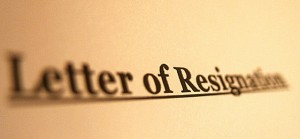How to Write a Resignation Letter
By / Learnist Careers
If you have made the decision to leave your current role, then you need to make sure that you follow the rules for resigning correctly. This will include writing a resignation letter, so your company knows of your intentions to leave. Here, we will explore more about how you should draft one of these letters.
Why do you need to write a resignation letter?
It does not matter if you hate your position and want to leave right away, in any job it is a good idea to write a resignation letter and serve your full notice period. There are several reasons why:
- If you need a referral in the future you are much more likely to get a positive one if you follow the rules when leaving.
- Maintaining good personal relationships in business is essential because you never know when you may have to deal with your existing employers again.
How to write the perfect resignation letter
It is imperative that you make sure your letter does not come across as aggressive in any way at all. Bosses often take resignation letters personally, and putting something that could add fuel to the fire is not going to do you any favours.
It is your goal, as the person writing the letter, to draft something that makes your boss feel like they are not responsible for your leaving, even if they are. This means you need to keep any personal feelings out of the letter and keep it strictly professional.
Here are some points you need to make sure you cover in your letter:
- You need to make sure you thank your employer for the time you have worked there.
- Explain very briefly why you are leaving, but do not make anything personal.
- If your reasons for leaving are really negative, it may be best to skip this part altogether and say that you have been offered a better role elsewhere.
An example of the ideal resignation letter
While these documents will differ from person to person, here is how you should draft your letter:
- Start with the name, title, organisation and address of your line manager in the top left-hand corner.
- Just underneath this write the date.
- Start with Dear Mr/Mrs/Ms/Miss and your bosses first or last name depending on how you would talk to them normally. For instance, if you call you boss Mr. Smith, start the letter; Dear Mr. Smith. However, if you call your boss James, start with; Dear James.
- The opening sentence should be the subject line; Letter of resignation.
- The opening paragraph should state the reason/s why you are leaving. However, as mentioned, keep it short, and do not make it personal.
- The next paragraph should talk about helping during your notice period to pass over your work, if this is a requirement. It is also a great idea to mention that you would be more than happy to train somebody in your position in your notice period.
- Mention that you intend to see out your full notice period. However, if you are not starting a new role for a while or you can work longer than your notice period states, then mention this to your employer. They will rarely take you up on your offer, but this is one of the nicest gestures you can make in a resignation letter.
- End by saying thank you to your employer for giving you the opportunity to work for the company.
- Sign off with; yours sincerely and your full name.
What you should not write
It is imperative that you do not write an essay about why you are leaving. Regardless of the reasons for your resignation, you should keep it short and to the point. In no circumstance should you use this letter to vent any frustrations.
Writing a resignation letter can be tough. You are leaving your role because you’ve either found something better, or you can no longer stand working for that company so either way getting your feelings across on paper can be hard. However, if you follow the above guide you can keep things to the point and continue to maintain both working and personal relationships.
Example resignation letter:
Dear Sirs;
Further to our recent conversation I write to confirm that I am no longer able to continue working for this company as I no longer feel a passion for the tasks I am required to undertake.
I will do my utmost to make the transitional notice period as smooth as possible while I complete projects and pass over clients to my colleagues, or offering any training to new staff as required.
I am aware that my employment contract requires me to provide 4 weeks notice and therefore expect my final day at work to be 3rd August. My new job commences on 20th August so if I would be happy to discuss extending my notice if this would be useful to you?
Thank you again for all the training and support you have provided my during my time working for you. I wish you and the company every success in the future.
Yours sincerely,

